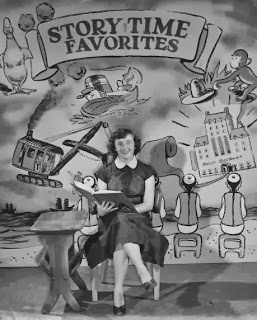This blog entry I am going to talk about a real world
example of using popular culture to engage with youth. This example is a Young
Peoples Librarian… who also happens to be my mum.
My mum is a former high school English teacher, who
decide on a career change when I was in high school (yes, there could
potentially be a link here but it’s not relevant). Upon her completion of her
university graduate diploma (from QUT no less), she applied for the role of
Young Peoples Librarian.
That was awhile ago now, and since then, the YPS section has
undergone some changes and the services they provide are some of the most
popular activities within the library. A short while ago, a position was
created for a Young Adult Librarian to focus on the YA collection and users of
the library.
Some of their most regular and popular services include:
Baby Bounce: for mums and bubs under the age of 18 months,
sit along and sing along to rhymes and songs.
Storytime: For the youngens aged 2-5. They sing, they dance,
they read books.
School holiday activities: To help keep those pesky primary
school kids entertained over their ridiculously long holiday periods.
MakerSpaces: I still don’t understand what they do, but they
have a 3D printer called ‘Dave’ and last week they were making little houses
which would light up when it gets dark. @yalsa was retweeting about this
concept only this morning. (See my resource page for librarians)
Friday Frodos: Friday afternoon activities for teens aged
12-18. I recall a manga drawing class and a knitting class. Quite varied
options obviously.
I asked my mum one afternoon - ‘how do you use popular
culture to engage with your children and youth population?’. Her response was a
sigh as she struggled to think of an answer. I admit, I probably didn’t choose
the best time to ask her such a question without any preamble and we had a
friend visiting from the UK. The champagne was a welcome distraction for all
involved.
I still haven’t given her any preamble or questions so that
she can mull it over and she has given me permission to write this profile on
her. After going over her role and services, I made a startlingly obvious conclusion:
All of these activities involve popular culture.
In the Storytime sessions she dances and sings to the
Wiggles (Point Your Fingers and Do the Twist is a favourite of mine) as well as
reading a variety of books, both old and new and different themes each week.
Baby Bounce has nursery rhymes and songs that we all would
have heard when we were younger. That’s got to be a form of popular culture if
all of us can remember those rhymes and songs right?
School holiday activities are the same; they use popular
current ideas to create activities for the kids.
For the older teens, the Friday Frodos create movie nights with
pizza and dress up (a Twilight night was a huge success years ago), manga
drawing lessons. These sessions are aimed at using popular culture or “the cool
stuff” to get the kids involved.
The more I think about it, the more I realise how much
popular culture they use, even if they don’t call it ‘popular culture’. What we
are exploring here, they are already doing, and with great results.
So there may be those who harbour the view of libraries being out of touch with the real world; but really, they've been doing this stuff for longer than we've been alive.44
(Estepp, 2012)
Your local YPS Librarian or school librarian is probably the
greatest resource when it comes to engaging youth through popular culture because
they are already doing it. And I mean, they’re librarians – if they don’t know
it, they can find it.
Mum & I, so cool we take #selfies (personal image)
Written with much appreciation to my mum for being a thoroughly fantastic resource and role model.
IMAGES




